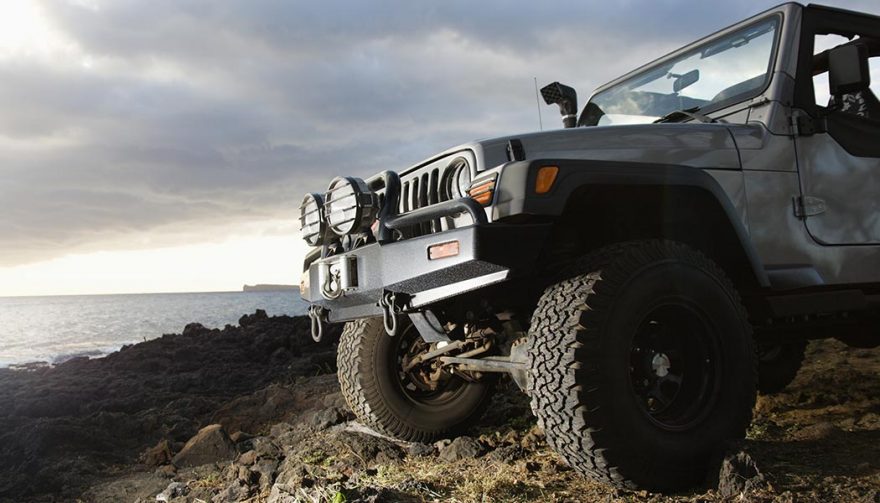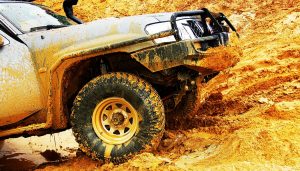
Taking straps, food and friends will always improve your off-road experience
Tips to Make Any Off-Road Experience More Enjoyable
Few things are as enjoyable as going to the great outdoors and getting dirty with your vehicle. The challenge of plowing through mud, crawling over rocks or fording rivers is downright addicting.
Sadly, some people head out for an off-road experience that is just okay or maybe even horrible. This is usually because of a lack of preparation or knowledge.
Tips for a Great Off-Road Experience
Before you take on another off-road excursion, take a look at these tips. Each one can enrich your journey, no matter if you’re headed to an area nearby or are hitting a dream trail thousands of miles away.
Always Go With Others
Even if you’ve gone off-roading alone before and nothing’s happened, that doesn’t mean it’s a good idea. All it takes is getting really stuck, and you’ll see why having a buddy with a second vehicle is essential. Even if you have a rig that can make it through all sorts of terrain, everyone gets stuck at least once. Mechanical failures can also leave you stranded.
Take Straps
If you’re heading out on a trail, you should have heavy-duty recovery straps packed. Even if you have a winch, bringing along straps just gives you more options, and they don’t take up much space. Don’t use any that are fraying at all, because that could lead to disaster.
Be Careful With Winches
Winches are great to have on any off-roader. Unfortunately, a lot of people get hurt because they don’t really know how to be careful with using them. You should always inspect the cable before you head out on the trail. If there’s damage, get a replacement immediately. If the cable snaps during a recovery, it can fling with deadly force, hitting standers-by or the windshield on either vehicle. To help reduce that risk, put a heavy blanket over the middle of the cable during the recovery and have everyone who isn’t actually doing the recovery stand far away.
Bring Along Food And Water
Even if you’re just going out for a quick excursion nearby home, at least take some bottled water and some granola bars with you in a pack. The fact is quite a few off-roaders have found out the hard way a trip can take way longer if they run into an unexpected situation. Instead of being hungry and thirsty, pack plenty of food and water so you’re ready for anything. Worst case scenario, you’ll never use it.
Take Things Slow
You’re not driving on a maintained off-road race course like a Trophy Truck, so don’t act like it. Instead, drive a little slow, enjoy the surroundings and make sure you don’t get in over your head. You should always be scanning the trail ahead for any potential pitfalls like deep holes, rocks, logs, etc. You should learn to crawl through difficult terrain. Going too fast doesn’t give you enough time to react if the terrain turns really rough.
Cross Water With Care
Automakers love to show their SUVs crashing through streams and pools of water, spraying it all over the place. It doesn’t just look like fun; it really is a blast to do. But if you aren’t careful, you could end up with your vehicle submerged above its roof and maybe even kill someone.
Water crossings are inherently dangerous. What may look like a shallow pool could be ten feet deep. A lazy river could have a serious current deep under the surface. Sharp rocks can line the bottom of a creek. If you’re not familiar with the course, the best thing is to get out and inspect any water before attempting to cross. Having a pole to test for depth is a great way to see if crossing is even possible. Plot how you’ll get out of the water once you’re in, because not having an exit strategy can be disastrous.
Take An Air Compressor
If you’re going to be hitting diverse terrain, having an onboard air compressor is a must. The best setup is having a way to secure the compressor that can be undone quickly, that way you can fill up yours and others’ tires easily. With mud and sand, you’ll actually have better traction if you let about 15 to 20 psi from your tires, making the contact patch bigger. Of course, once you get to regular dirt, a road, etc. you’ll need to refill the tires, which is where the air compressor comes in.
Other Essentials
For any off-road excursion, you should always take along a “kit” or several items that are good to have on the trail. Have a good first aid kit that’s waterproof, just in case of an accident. A shovel is essential, since you might need it to dig out if you do become stuck. Take extra fuel, because a trip that becomes unexpectedly long could mean you run out, otherwise stranding you.
If you’re with another vehicle, which you should be, take along radios so you can keep communicating while on the trail. These come in handy if your group sees a situation the other might not, or if you become separated. Always have a paper map or GPS system as well, avoiding the embarrassment of getting disoriented and lost. Also, if a portion of the trail is closed off, you can figure out how to get around it. Taking a waterproof pack with a change of clothes, just in case you get soaked, plus things to start a fire is a good idea as well.
Tell Someone Where You’ll Be
Any time you head into the outdoors, no matter if it’s for hiking, skiing, kayaking or off-roading, you should tell someone who’s staying behind exactly where you’re going. That person should also know how long you plan on being gone and where you expect to be when, if you’re planning on making several stops along the route.
This isn’t borne out of paranoia, just good sense. Plenty of people have run into a situation where they’re stranded. Search crews can find you a lot faster if they have a good idea where you are.





